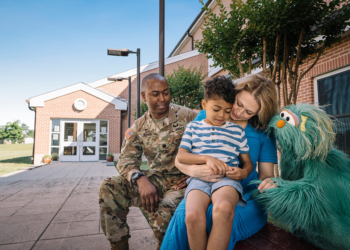With two ongoing wars and a potential third taking shape, military families are struggling under the weight of stress. For those with deployed service members, it can be overwhelming. But Corie Weathers — a licensed counselor, published author and Army spouse — has some advice for managing stress and anxiety: pause and breathe.
“The intense years of GWOT [Global War on Terror] taught many of us the value of distancing or limiting the amount of news we take in,” Weathers said. “Today, we are often quick to absorb the headlines without realizing how our bodies and minds are reacting, especially when the news cycle finds you around every corner on social media, in your favorite podcasts, on TV, easily accessible on your device, and brought up during casual conversations.
“In moments when the news feels volatile or uncertain, give yourself permission to step back from the stream of information. Your nervous system wasn’t designed to take in constant crisis.”
The Russia/Ukraine war began more than three years ago, while the conflict waged by Israel against Hamas, the terrorist organization ruling Palestine, enters its second year. Iran has backed its own terrorists and entered the fray, which has led to American warriors being put in positions of strength and warning to its leader.
As American military families watch the landscape and send their loved ones overseas, Weathers has some suggestions for navigating feelings of anxiety.

“If you genuinely feel that you’re having difficulty functioning with daily tasks, work or engaging with your family, then contacting a professional or going to your doctor is an understandable first step,” Weathers said. “Anxiety, however, often comes from situational stressors — conflict in relationships, the news cycle, fears of the future or even worries concerning those you love.
“I like to treat anxiety first from a physical angle. Exercise can be your first line of defense. If you can, get active. Go for a run, a bike ride, or go to the gym. It’s one of the best ways to release extra energy from your body. However, even a walk outside for 20 minutes in the fresh air has been proven to calm the body’s nervous system. Do not underestimate the power of movement!”
Weathers also recommends combating anxiety through journaling or practicing mindfulness or disciplines aligned with your faith. She said another underutilized support for navigating symptoms of anxiety is breath work.
“You have probably heard this a million times, but I am always shocked at how often we do not practice the skill of breath control,” Weathers said. “Your breath is the most powerful resource to control anxiety. Prayer, meditation or breathing practices can help your heart rate get back in sync with your breath and physically calm your body.
“My favorite resource is the Army Wellness Center, which is located on most military installations and serves multiple branches. Service members and family members can, for free, make an appointment and be taught how to control their breathing and walk away with a tailored approach that works for them and their body.”
Weathers also encourages military families to pay attention to what they’re consuming on social media or on the news. If it becomes too much, she suggests relying on the service member or the unit leadership for updates.
“When I wrote ‘Military Culture Shift’ in 2023, we had not yet entered the shift we are going through now that is creating anxiety and uncertainty,” she said. “We carry collective memories. For many, today’s news about troop movement or tensions overseas activates stored emotions from past deployments, losses, or trauma. The body remembers what the mind tries to forget. You have permission to protect your peace. If the information you’re taking in isn’t actionable and it’s creating more anxiety than clarity, it’s okay to disengage for a while.
“Now is the time to start reaching out and building connections with the village, namely your peers in the military community and those who have gone before you. There is so much wisdom that older generations of military spouses have to share on navigating potentially rough deployments and fear of future global conflicts. The best advice I can give is do not go at this alone.”
As for the increasing hostilities from Iran, she knows there are mixed reactions. While young service members might be eager to put their training into use overseas, those who served during the GWOT-era might dread another conflict so closely on the heels of Afghanistan.
“The uncertainty around Iran brings a familiar kind of ache — and sometimes dread — for military families,” Weathers said. “Everyone in the military culture will have a different response anytime there is news of troop movement.”
However, reminding ourselves of the meaning of service and why it matters can help families manage the situation better, she said.
“We have always been proud to deter potential threats to our nation and serve those oppressed and impacted by atrocities that we have not known in our country,” Weathers said. “I choose to believe as an active-duty military spouse myself that if our service members are called to go, there will be a good reason.
“When a civilian tells my husband ‘Thank you for your service,’ I like my husband’s response. He answers, ‘You’re worth it.’ And that is still true even when we disagree with policy or feel wounded by our nation’s division.”
For more information and insight, visit Corie Weathers‘ website.
Read comments












































